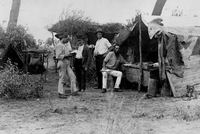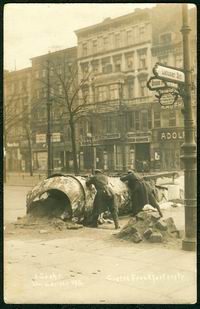Seeds of Fire: A People’s Chronology
Recalling events that happened on this day in history.
Memories of struggle, resistance and persistence.
Compiled by Ulli Diemer
|
January 5, 1534
|
|
|
Radical Anabaptists attempt to establish a communal religious government in the German city of Münster. They establish the practice of adult baptism, signifying their belief that only adults capable of consciously accepting religious faith should be initiated into a church. They reject the prevailing religious practice of automatically baptizing infants who are incapable of understanding the religion that is being imposed on them. They also take steps to introduce community of goods, that is, holding property in common rather than as private property. They hold the city for 18 months, but ultimately Münster is conquered, and the Anabaptist leaders are tortured and killed. Subsequently their bodies are displayed in cages hung from the steeple of St. Lambert’s Church: the cages remain there to this day (2013), though the bones inside have been removed.
|
|
January 5, 1891
|

|
|
Start of the 1891 Shearers’ Strike, one of Australia’s oldest and most important industrial disputes.
|
|
January 5 - 12, 1919
|

|
|
Outbreak of the Spartacist uprising in Germany, a general strike, and armed battles, initiated by radical workers. The uprising begins spontaneously, after the newly formed Social Democratic government dismisses Berlin’s chief of police, a socialist who has refused to use force against striking workers. Workers take to the streets in protest. Some leaders of the newly formed Communist Party (formerly known as the Spartakusbund), including Karl Liebknecht, urge turning the protests into an armed uprising to overthrow the government. Others, notably Rosa Luxemburg, warn that an uprising is premature and likely to lead to disaster. The Social Democratic government, headed by Friedrich Ebert, brings in heavily armed right-wing Freikorps militias to attack the workers. The uprising is put down within a week. Luxemburg and Liebknecht are both captured and murdered by the Freikorps. The suppression of the revolt is generally considered to mark the defeat of the German revolution.
|
|
January 5, 1968
|
|
|
Alexander Dubcek becomes the leader of the Czechoslovak Communist Party; inaugurating the liberalization known as the Prague Spring, which ends with a Soviet invasion in August 1968.
|
|
January 5, 1978
|
|
|
Police in Toronto lay charges against Pink Triangle Press, publishers of the gay liberation newspaper The Body Politic, and three of its officers for possession of obscene material for distribution (i.e. the newspaper) and use of the mails for purpose of transmitting anything that is indecent, immoral or scurrilous (i.e. the newspaper).
|

